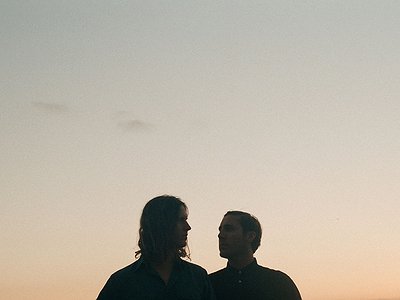Could you take us through a day in your life, from a possible morning routine through to your work? Do you have a fixed schedule? How do music and other aspects of your life feed back into each other - do you separate them or instead try to make them blend seamlessly?
My routine is all over the place. Recently, the early hours of my days have been used to work on the business side of our work (answering emails/interview questions/logistics/planning). Some days I want to get out of the house immediately. Some weeks I want to work in the studio all day long and some weeks I don’t want to touch an instrument. Some days I like to go swimming all day and then sing until 3 in the morning. Some years I write two records worth of music and some years I write none. I think the only consistent thing is that thru all of it I am always listening to music. That’s the one thing that never goes away.
Could you describe your creative process on the basis of a piece or album that's particularly dear to you, please? Where did the ideas come from, how were they transformed in your mind, what did you start with and how do you refine these beginnings into the finished work of art?
Well I think I can speak most easily about our most recent record, ‘Clear Language.’ It is our first full length record in 5 years so a lot can change in the world and in our lives in that time. After our last recording, ‘Stranger’ came out and we spent about a year touring in the US and EU in support of it we were all a little worn out. It can become a somewhat numbing cycle to go through and we had created a record almost every year for 5 years. I think that we both knew that if we wanted to continue with Balmorhea that we needed to step away from it for an extended period of time. For me, every entry in the catalogue becomes harder and harder, in that you are wanting to create something new and expanding your creative reach, but make something that still fits into the world and heart of the group. This gets more difficult each time. For us, the entry back into the world of making new Balmorhea songs was to completely detach any pressure from the process and work as slowly and methodically as we could. From there it is simple, just work until you have something you want to share.
There are many descriptions of the ideal state of mind for being creative. What is it like for you? What supports this ideal state of mind and what are distractions? Are there strategies to enter into this state more easily?
I feel most creative when I am pursuing an idea that gives me pleasure. It is selfish. Coming up with a melody or phrase that I want to continue playing over and over for hours. Like when you are half way through a delicious meal and you wish that you could continue on eating it even after the food gone. I do not know how to find or channel this energy, for me it seems to come out of nowhere. I do know that this feeling will not come unless I put myself in a position to explore, so for me that means sitting down at the piano or with the guitar. My easiest distractions, the ones I wish to eliminate the most, are distractions of success and necessity. I wish I could wake up every morning and listen to music for two hours and then spend the rest of the day at the piano.
How is playing live and writing music in the studio connected? What do you achieve and draw from each experience personally? How do you see the relationship between improvisation and composition in this regard?
Making a recording is not satisfying to me, but it is incredibly rewarding; meaning, it is quite difficult to get it correct in the studio and takes a lot of intense focus and often times disagreement and argument. But once it is complete it feels incredible to have made something from nothing. Playing live is about the exploration and expression of those ideal ideas and inserting them into an environment. It can be exhilarating and terrifying. I love the feeling of a group of people in a space all trying to latch on to these amorphous ideas. It’s magic.
How do you see the relationship between the 'sound' aspects of music and the 'composition' aspects? How do you work with sound and timbre to meet certain production ideas and in which way can certain sounds already take on compositional qualities?
These are both part of the compositional process. How you generate a sound and how you shape a sound and how you arrange a sound all of a compositional intention. For me it’s all the same.
Our sense of hearing shares intriguing connections to other senses. From your experience, what are some of the most inspiring overlaps between different senses - and what do they tell us about the way our senses work? What happens to sound at its outermost borders?
I love the sound of the water draining out of the shower head and back down into the faucet when you turn the water off and the sound of people swimming and the sound of wind distorting a microphone.
Art can be a purpose in its own right, but it can also directly feed back into everyday life, take on a social and political role and lead to more engagement. Can you describe your approach to art and being an artist?
For me, being an artist is about doing my best to be unashamed about who I am and what I see and hear and what I want to see and hear and what I want the world to be like and what it is. About trying to discover the ways that my individual self relates to the world. It is terrifying and humbling to try and change things with ideas and feelings.
It is remarkable, in a way, that we have arrived in the 21st century with the basic concept of music still intact. Do you have a vision of music, an idea of what music could be beyond its current form?
I think that is what I’m always trying to envision with every new composition. The most outlandish statement could be the most simple one.



